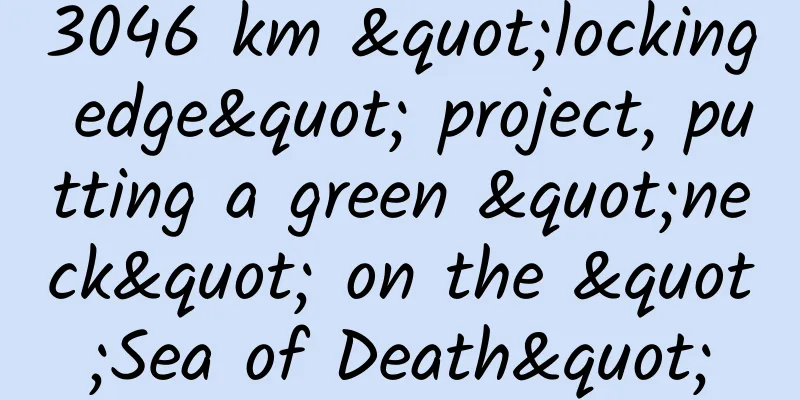3046 km "locking edge" project, putting a green "neck" on the "Sea of Death"

|
Author: Li Chuanfu Shi Xiangqi The Taklimakan Desert, a "sea of death" located in the center of the Tarim Basin in Xinjiang, is famous for its mysterious and magnificent scenery and hidden dangers. When the wind blows, the sandstorm covers the sky and causes serious damage to farmland, transportation and ecosystems. In order to control the wind and sand, my country has implemented a grand project - building a green sand-blocking protection belt around the Taklimakan Desert to "lock the edge" of the desert. The difficulty of this project lies in the special geographical location and climatic conditions of the Taklimakan Desert. The desert is located in the center of the Tarim Basin surrounded by the Kunlun Mountains, the Pamir Plateau, and the Tianshan Mountains. The warm and humid air currents of the monsoon are exhausted before reaching the desert, and the towering Tianshan Mountains block the water vapor from the Atlantic Ocean, making the Taklimakan Desert extremely dry, with an average annual precipitation of no more than 100 mm, but evaporation of up to 2,500 to 3,400 mm. Under such conditions, afforestation and grass planting are extremely difficult, and the control of sandstorms is even more difficult. However, after years of hard work, the project has made historic progress. By the end of 2023, a 2,761-kilometer green sand barrier has been formed around the Taklimakan Desert, connecting the oases. On November 28, 2024, with the planting of the last rose seedling, the 285-kilometer-long Taklimakan Desert edge blocking battle blank area was successfully "locked and closed", marking that the 3,046-kilometer-long "green scarf" has finally been woven. The difficulty of "locking the edge" of the Taklimakan Desert lies in the vastness of the desert and the fluidity of the sand dunes. The Taklimakan Desert is the second largest mobile desert in the world, covering an area of 337,600 square kilometers, with an area of about 258,400 square kilometers of mobile sand dunes, and the highest point of the sand dunes can reach about 300 meters. In such an environment, building a green sand barrier is a huge challenge. Engineering sand control, photovoltaic sand control and biological sand control are the three main sand control methods used in the "locking edge" project of the Taklimakan Desert. They each play an important role and complement each other to jointly build an ecological barrier. Engineering sand control: This method mainly blocks the spread of quicksand by inserting reed stalks into the sand, laying grass grids, or setting up high vertical sand barriers. For example, in Minfeng County, Hotan Prefecture, Xinjiang, China Railway Construction Development Group undertook a 35-kilometer border-locking and sand-fixing task, and built a comprehensive prevention and control system of "sand fixation + sand blocking" through three lines of defense: high vertical sand barriers, grass grids, and wide forest belts. These sand barriers are mainly composed of wooden stakes connected to the windproof surface of reed stalks, which can reduce wind force and make the sand more stable. Engineering sand control is low-cost and quick to take effect, and is a very effective physical blocking method. Photovoltaic sand control: In areas with scarce water resources, the construction of photovoltaic power stations can not only generate electricity, but also reduce surface wind speed and stabilize sand. Photovoltaic panels are equivalent to high vertical sand barriers, which can reduce wind speed and weaken the sand-carrying capacity of wind and sand. In Maigaiti County, the construction of photovoltaic power generation bases effectively utilizes solar energy resources and achieves the goal of desert control and ecological environment improvement. Photovoltaic sand control achieves efficient utilization of land and solar energy resources, and explores the dual mode of "physical sand control + biological sand control". By setting up lock-edge grass grids on the periphery of the photovoltaic area and planting sand-loving plants on the inner periphery, a better sand control effect is achieved. Biological sand control: In areas with good water resources, suitable sand-proof and drought-resistant plants, such as Calligonum mongolicum, Camel thorn, Tamarix, and other perennial plants, are planted to restore vegetation and conserve water. This method can not only stabilize sand, but also improve soil and increase income. For example, in Hotan County, by planting plants such as red willow, not only the sand is fixed, but also the income of local residents is increased. Biological sand control is a more lasting and eco-friendly way to improve the desert environment by increasing vegetation cover. These sand control methods not only effectively prevented the expansion of the desert, but also promoted the development of the local economy. For example, in Yutian County, Hotan Prefecture, desert ecological governance was combined with the development of the sand industry, and the development of Cistanche deserticola-related industries opened up a new path for the people to increase their income and become rich. Cistanche deserticola, known as the "desert ginseng", has high medicinal value. Planting Cistanche deserticola allows villagers to work seasonally and increase their income. The "locking edge" project of the Taklimakan Desert is not only a great restoration of the ecological environment, but also a great test of human perseverance and wisdom. It demonstrates the brilliant achievements made by my country in the fight against desertification. Through this endless green sand-blocking protection belt, the solid barrier of ecological protection has been significantly enhanced, providing strong support for the sustainable development of the region. The success of this project is not only a conquest of nature, but also the beginning of harmonious coexistence with nature. It will leave precious ecological wealth for the future. |
>>: It's time to wear down jackets: a complete guide to buying, matching and cleaning them in one go
Recommend
October "Science" Rumor List | Cardiovascular Disease Special Topic: Can antihypertensive drugs cause dependence? Can intravenous infusion prevent stroke?
People with "three highs" cannot eat eg...
Now that mini programs are here, how should we respond?
What does a mini program mean to users? "Som...
Wi-Fi speed test: iPhone 6 is inferior to Samsung S6
Remember the last battle of the best smartphones?...
Here, let me teach you how to crack an iOS APP
Today I will give you some hard knowledge. There ...
What knowledge do you need to learn to be a programmer?
Anyone who asks this question should be beaten, d...
How long does it usually take for a submitted Baidu Smart Mini Program to be reviewed and approved?
Q: How long does it take to review a Baidu Mini P...
How to plan creative materials for high-conversion information flow ads? Avoid these 4 mistakes!
Before talking about what is good information flo...
With 0 advertising investment, how can K12 education achieve 150,000+ paid conversions?
Under the premise of 0 fans and 0 investment, how...
International Energy Agency: Natural Gas Analysis and Outlook 2022-2025
The report believes that from the demand side, af...
Inventory | Characteristics of major information flow channels in 2018
Since the beginning of this year, super apps such...
A large collection of short video emotional copywriting resources, with tens of thousands of emotional copywritings of various types, so that you no longer have to worry about copywriting
A large collection of short video emotional copyw...
In Poyang Lake, rotifers create 133 trillion plastic particles every day
The total number of nanoplastic particles produce...
Deconstructing private domain traffic: How to manage store private domain?
"Commodities first appeared in the Xia Dynas...
The full screen bomb is playing crazy WeChat Android version 8.0 beta version is here, download attached
WeChat seems to prefer iOS. The latest version is...
30 most common oCPC delivery questions and answers!
In this article, I have sorted out 30 of the most...









